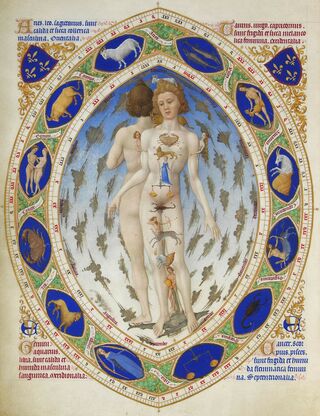Personality
The Final Word on Astrology and Personality
The problem with "paranormal determinism."
Posted June 30, 2022 Reviewed by Gary Drevitch

Although many people believe that having astrological information about a person, such as their birth sign, can provide insights into their personality, there is an overwhelming lack of scientific support for this. For example, a review of studies found that professional astrologers who were asked to match someone’s birth chart with information about their actual personality rather than that of a completely different person were no more accurate than chance. Similarly, people asked to pick out an astrological interpretation of their actual birth chart from a random selection of other people’s charts could not do so accurately (Dean & Kelly, 2003).
Does Belief in Astrology Shape a Person's Self-Perception?
Despite this, there have been a number of studies that have claimed that a person’s belief in astrology might influence how they describe their own personality, through a self-stereotyping process. In one study with 422 people (Van Rooij, 1999), participants indicated how well 96 traits (8 for each sun sign) derived from astrological literature applied to them. For example, Aries is considered impulsive, Taurus conservative, and so on. Participants were considered to have astrological knowledge if they knew their own sun sign and at least three traits associated with it. Indeed, astrologically knowledgeable participants were found to be more likely to apply the relevant traits to themselves than those without such knowledge.
Other research has tested claims that people born under sun signs considered to be “positive” are more extraverted than those born under “negative” signs. In astrology, odd-numbered signs are traditionally considered “masculine” or “positive” as they are associated with the “active” elements of fire and air, while the even-numbered signs are considered “feminine” or “negative” as they are associated with the “passive” elements of water and earth. As extraverts are more outgoing and energetic than introverts they are supposed to have an affinity with positive birth signs.
One study with 743 people (Chico & Lorenzo-Seva, 2006) tested whether this purported relationship between positive signs and extraversion might depend on a person’s belief in astrology. The study found that among people born under a positive sign, those who believed in astrology were higher in extraversion. However, among those born under a negative sign, there was no difference between believers and non-believers.
Zodiac Signs Are Unrelated to Personality, Even in Believers
Intriguing as these studies are, they used relatively modest sample sizes, which raises the possibility that the results could be due to statistical artifacts rather than being substantive findings. A study in China (Lu et al., 2020) using a much larger sample can help resolve this issue, as even quite small statistical effects can be detected with thousands of participants. This would also help to dispel any remaining doubt about whether astrology itself has any scientific validity at all.
Using an online sample, Lu et al. recruited 173,709 Chinese participants aged 18 to 60 years old, who gave their date of birth, and completed measures of the Big Five personality traits of extraversion, neuroticism, openness to experience, agreeableness, and conscientiousness. Additionally, they tested whether any of the participants’ birth signs differed from each other in ratings of stereotyped adjectives associated with each sign that they had collected in a previous survey (e.g., such charming attributes as “venomous” for Scorpio, and so on). They also tested whether season of birth was related to any of the Big Five traits, as indicated by some past research. Additionally, a large subset of participants (17,373) were asked if they believed in astrology.
Unfortunately for the credibility of astrology as a subject, but unsurprisingly from a scientific perspective, none of the 12 astrological signs were significantly associated with any of the Big Five personality traits. Additionally, none of the four elements associated with each sign nor whether a sign was “positive” or negative” had any effect on personality. The only effect of season of birth was that people born in summer tended to be slightly more extraverted than those born in any of the other three seasons.
Furthermore, none of the 12 signs differed from any of the others in terms of their stereotyped attributes, e.g., Scorpio was not rated more “venomous” than any of the other 11 signs. They repeated the analyses for believers in astrology only and non-believers only and found the same results.
The results of this study suggest that people’s birth signs have no influence at all on their personality. Additionally, they suggest that a person’s belief in astrology also makes no difference. This would appear to contradict the idea that such belief might influence someone’s actual personality, such as their level of extraversion.
Astrological Stereotypes Can Have Negative Consequences
It is worth noting further that belief in astrology is not only scientifically baseless, it may have some undesirable social effects. Lu et al.’s research also included a series of studies on discrimination based on astrological stereotypes in China. They found that the sign Virgo in particular has negative connotations in China of being disagreeable, which are not found in Western countries, because of associated negative stereotypes related to the word “virgin” as indicating someone who is critical and fussy.
This stereotyping had real-world consequences, as their surveys found that Chinese people would be reluctant to date someone born under this sign, and managers admitted that they actually discriminated against them in hiring decisions. This latter behavior was particularly unfair, as Lu et al. used a large database of 32,878 employees who had both birthdate information and at least one performance evaluation and, unsurprisingly again, found that no astrological sign was related to ratings of actual job performance.
Negative social consequences associated with astrology do not seem to be restricted to China. Research in France (Dambrun, 2004) found that belief in astrology was associated with prejudice against Arabs and overweight people, and with more sexist attitudes. Interestingly, the result for sexism still applied even when only female participants in the research were considered.
Additionally, the study found that the relationship between belief in astrology and prejudice was mediated by attributions of internal responsibility for one’s lot in life, e.g., “poverty is the result of laziness.” Dambrun suggested that astrology might be associated with “paranormal determinism,” i.e., a person’s characteristics are fixed by destiny, which might encourage unsympathetic attitudes toward the less fortunate.
Another study in Europe found that people who think that it is very important for a child to learn obedience are more likely to believe that astrology is scientific (Allum, 2011). This suggests that astrology believers may have more authoritarian attitudes. To be fair though, it may not be belief in astrology itself that leads to prejudice or authoritarian views, as the underlying cause may be some other factor(s) related to all of these things.
If I were more optimistic, I would hope that the fact that no relationship at all could be found between zodiac signs and personality in a sample of over 100,000 people would be enough to put astrology to rest for good. However, irrationality seems to be deeply rooted in the human psyche, so I would not count on it just yet.
Facebook/LinkedIn image: pixelheadphoto digitalskillet/Shutterstock
References
Allum, N. (2011). What Makes Some People Think Astrology Is Scientific? Science Communication, 33(3), 341–366. https://doi.org/10.1177/1075547010389819
Chico, E., & Lorenzo-Seva, U. (2006). Belief in Astrology Inventory: Development and Validation. Psychological Reports, 99(3), 851–863. https://doi.org/10.2466/PR0.99.3.851-863
Dambrun, M. (2004). Belief in paranormal determinism as a source of prejudice toward disadvantaged groups: “The dark side of stars” | Dambrun | Social Behavior and Personality. Social Behavior and Personality: An International Journal, 32(7), 627–636. https://doi.org/10.2224/sbp.2004.32.7.627
Dean, G. O., & Kelly, I. W. (2003). Is Astrology Relevant to Consciousness and Psi? Journal of Consciousness Studies, 10(6–7), 175–198.
Hartmann, P., Reuter, M., & Nyborg, H. (2006). The relationship between date of birth and individual differences in personality and general intelligence: A large-scale study. Personality and Individual Differences, 40(7), 1349–1362. https://doi.org/10.1016/j.paid.2005.11.017
Helgertz, J., & Scott, K. (2020). The validity of astrological predictions on marriage and divorce: A longitudinal analysis of Swedish register data. Genus, 76(1), 34. https://doi.org/10.1186/s41118-020-00103-5
Lu, J. G., Liu, X. L., Liao, H., & Wang, L. (2020). Disentangling stereotypes from social reality: Astrological stereotypes and discrimination in China. Journal of Personality and Social Psychology, 119(6), 1359–1379. https://doi.org/10.1037/pspi0000237
Van Rooij, J. J. F. (1999). Self-Concept in Terms of Astrological Sun-Sign Traits. Psychological Reports, 84(2), 541–546. https://doi.org/10.2466/pr0.1999.84.2.541
Wunder, E. (2003). Self-attribution, sun-sign traits, and the alleged role of favourableness as a moderator variable: Long-term effect or artefact? Personality and Individual Differences, 35(8), 1783–1789. https://doi.org/10.1016/S0191-8869(03)00002-3
Wyman, A. J., & Vyse, S. (2008). Science versus the stars: A double-blind test of the validity of the NEO Five-Factor Inventory and computer-generated astrological natal charts. The Journal of General Psychology, 135(3), 287–300. https://doi.org/10.3200/GENP.135.3.287-300




